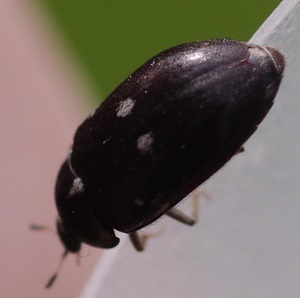An oval black beetle 4-6mm long with a white spot on each wing case. Grubs are about 6mm long, with a tuft of golden hairs on the end of their bodies. They can often be detected by their cast-off skins as they moult. Grubs feed on fur, hair, skins, feathers and wool and may damage the upholstery.
 Remedy
Remedy
Check the loft and eaves for old birds’ nests or dead birds. Spray or dust affected items; carpets, clothing etc. with an insecticide product labelled for beetle control on such surfaces.
See also Carpet Beetles.
Having problems with fur beetles?
Use a trained professional pest controller.
Search for your local BPCA member
Source: A-Z